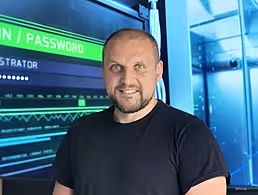So you’ve decided you want to work in tech. What do you do next, and what can you expect from your future career?
There are a myriad of career opportunities in tech, but figuring out which is the best fit for you can be a challenge. Hearing about the daily ins and outs of a particular job from someone who’s actually worked at it can be a great tool to help narrow things down.
We spoke to Philip Duggan, a senior software engineer at Storm Technology. He gave us some insight into what he does every day, and why software engineering is such an exciting role.
If there is such a thing, can you describe a typical day in the job?
My typical day here in Storm is 9am to 5.30pm. For the first half an hour, I check my email and browse some tech blogs and news sites while sipping a coffee. MSDN is a great source, with daily updates to hopefully steer my career along the correct path.
A typical day would involve some team meetings, coding, testing, and liaising with customers over some requirements or support cases.
Over the past 12 months, I have been upskilling in Azure and Xamarin. The list of new technologies seems to be endless, so there is always something to be learning.
What types of project do you work on at Storm?
I have worked on projects in transportation, social networking and financial services, which I believe gives me a broad knowledge of different kinds of software solutions.
Most recently, I worked on an e-commerce API, and provided DevOps consultancy and the redesign of travel medicine software. The latter was a .NET MVC web application deployed as an Azure app service.
What skills do you use on a daily basis?
.NET skills for web (MVC, WebAPI, Web Services), C#, JavaScript, SQL Server, Entity Framework.
Teamwork, communication and motivation are also important, as is a willingness to stay current with the latest technologies and learn from others. After all, there is strength in numbers.
What is the hardest part of your working day?
Avoiding scope creep – uncontrolled changes that occur when the scope of a project is not properly defined. Sometimes there may be temptation to make a ‘small’ undocumented change, a request from a customer perhaps, that is not in scope of the current iteration. This is to be avoided. These type of additions need to be analysed for its impact on the project objectives and scope and should be added to the backlog for consideration.
Do you have any productivity tips that help you through the working day?
It is all about planning.
Each new project in Storm implements Cirrus, our own methodology for managing and delivering projects. Using it in tandem with Visual Studio Team Services (VSTS), team members can contribute to the traceability and transparency as a project progresses.
You often hear sports people say ‘focus on the next game’ – there is probably something in that. As a software team, it is important to set some clear goals for the day, week or month, with realistic estimates. VSTS offers an excellent visualisation of flow and status of tasks.
When you first started this job, what were you most surprised to learn was important in the role?
Probably the opportunity to use and experiment with new technologies. Even though the learning curve is steep, the challenge is exciting. Other companies that are product-focused often do not afford their developers the same opportunity.
How has this role changed as the tech sector has grown and evolved?
When I started out as a developer, the role involved building an application and, sometimes, you might be tasked with deploying that application to a target server. With the emergence of cloud computing and DevOps, the variety of tools and services available now means that the role of the developer has evolved.
Here in Storm, we use the Microsoft Azure cloud, and the team delivers high-performing scalable applications. We also use Power BI and Application Insights to gain invaluable data on the performance and usability of an application. So it’s not a case anymore of deploying an application and waiting to be informed of a bug or poor performance – we should know that before a user does, and get a new release out quickly.
What do you enjoy most about your job?
The variety of projects and exploring new technologies.
I also work with a talented bunch of people. They’re friendly and always willing to help. We are a multicultural office with people from around Europe, the Middle East and Longford, so conversations about the weather are common.
Looking for jobs in tech or science? Check out our Employer Profiles for information on companies hiring right now.




